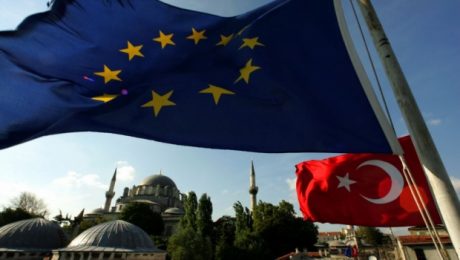Opinions

Can a Post-Coup Turkey Get Along with Europe?
None of this has stopped the government from undertaking a huge, self-destructive purge, with around 10,000 people arrested, 100,000 people dismissed, and the seizure of assets of more than $4 billion, numbers that worry not just human rights activists but foreign investors as well. The government’s fury is understandable but it should distinguish between those who took part in the coup and those who simply belonged to the Gulen movement.

Long Arm of Erdogan – His campaign should not be allowed to infiltrate the streets of Britain
Germany, dependent on Turkey to hold back the migrant flow to Europe, has been muted in its response. The United States, under pressure to push Mr Gulen out of his exile, has also tried to soothe nerves in Ankara. Britain should not be so amenable. This campaign should not be allowed to infiltrate the streets of Britain.

Abundant accusations [against Hizmet], little evidence
The Turkish media – or what is left of it – has already found Fethullah Gülen guilty of the coup attempt on July 15. When challenged about the evidence, the most common reply is “Come to Turkey and see” or “Everyone in Turkey thinks this way.” This almost unanimous opinion is not a coincidence, and it does imply a monopoly over the Turkish media rather than any objective fact.

Turkey’s Changing Freedom Deficit
Erdoğan’s government is by no means the first to compel Turkish citizens to hide their preferences and beliefs. Under the secular governments that ruled Turkey from the 1920s to 1950, and to some extent until 2002, pious Turks seeking advancement in government, the military, and even commerce had to downplay their religiosity and avoid signaling approval of political Islam.

Fear and paranoia still stalk Turkey two months after the failed coup
The official government narrative is everywhere, from the Twitter accounts to the dominance of the state-affiliated and pro-government press and TV in the wake of media crackdowns. The same words and phrases have been repeated endlessly by the AKP and their supporters until they become almost meaningless – Get Gülen. Gülen. Gülen. We are democracy. Democracy. Democracy. That is how it is, and there is no room to consider anything else.

Turkey’s Intelligentsia Kneels to Erdogan
This selective application of democratic rights by Turkey’s intelligentsia only helps Mr. Erdogan consolidate his power. In their double standards, he finds tacit approval for his purges. Turkey lacks not only sturdy institutions that guarantee a system of checks and balances and the rule of law, but also a critical mass of citizens with the courage and integrity to demand them.

Turkish coup d’état: a failed test for the EU
Once the purges started, however, the game changed. The EU should oppose the purges as a symptom of an authoritarian turn and attempt of centralization of power by the ruling elite. By definition, a coup d’état is an illegal overthrow of the governing machine in place so to trigger a regime change. The response to a golpe by the ruling government should then be used as an opportunity to consolidate the power of the legitimately elected administration and give evidence of national unity.

Questions we dare not ask: Gülen and the coup
Gareth Jenkins once criticized Turkey’s infamous Ergenekon indictments on the grounds that they were “products of ‘projective’ rather than deductive reasoning, working backwards from the premise that the organization exists to weave unrelated individuals, statements and acts into a single massive conspiracy.” Other than being a far more extreme example of “projective” rather than “deductive” reasoning, how is the Turkish government and its media’s attempt at connecting Turkey’s failed coup with Fethullah Gülen and the Hizmet movement he inspires any different?

The cleric, the coup and the conspiracy
In Pennsylvania, Gülen and his aides scrambled to denounce the coup attempt as it unfolded. “As someone who suffered under multiple military coups during the past five decades, it is especially insulting to be accused of having any link to such an attempt,” Gülen said in a statement, referring to Turkey’s spotty democratic history. The U.S. also was quick to condemn the coup attempt, but not quick enough for many in the Turkish government and media.

Turkey Coup: Fethulah Gulen Is Not A Terrorist
Fethulah Gulen did not fall from the sky or moon, he has a history that is in the public domain, the question is why did it take Erdogan too long to realize that Gulen is a terrorist? All through the years of robust relationship between Fethulah and Erdogan there was no accusation that Gulen was a terrorist, why now?

Why Turkey wants to silence its academics
Where will Turkey go from here? I spend many sleepless nights, feeling just as I did when I first read George Orwell’s “1984.” Just like Orwell’s dystopian society – a society with oppressive controls – the current Turkish state and the government are, it seems, out to silence all people capable of producing new and independent thinking and research in Turkey. As most of such minds are concentrated in Turkish academia, they will all be destroyed unless they turn into obedient and pious consumers.

Turkey’s Brain Drain and the Disappearing Academic Freedom
Hasan was the luckiest because he was not in Turkey during the coup. He was studying abroad on July 15th and learned the coup through the Internet. He was supposed to go back to Turkey but he decided not to do so because of the news on the immense purging in mostly the government and some private institutions. Few days after the coup he learned that he was dismissed from his position at a state university.

The Process Behind Turkey’s Proposed Extradition of Fethullah Gülen
By publicly campaigning for Gülen’s immediate extradition—before a formal request had been submitted—Turkish officials reinforced the idea that the United States is somehow protecting Gülen or resisting the extradition process. That is not true. There will be critics of any eventual decision, just as there are critics of the delay in reaching a decision. Whatever the result, both governments should communicate the decision with consideration for the long-term relationship and should operate on the assumption that the other is acting in good faith.



















